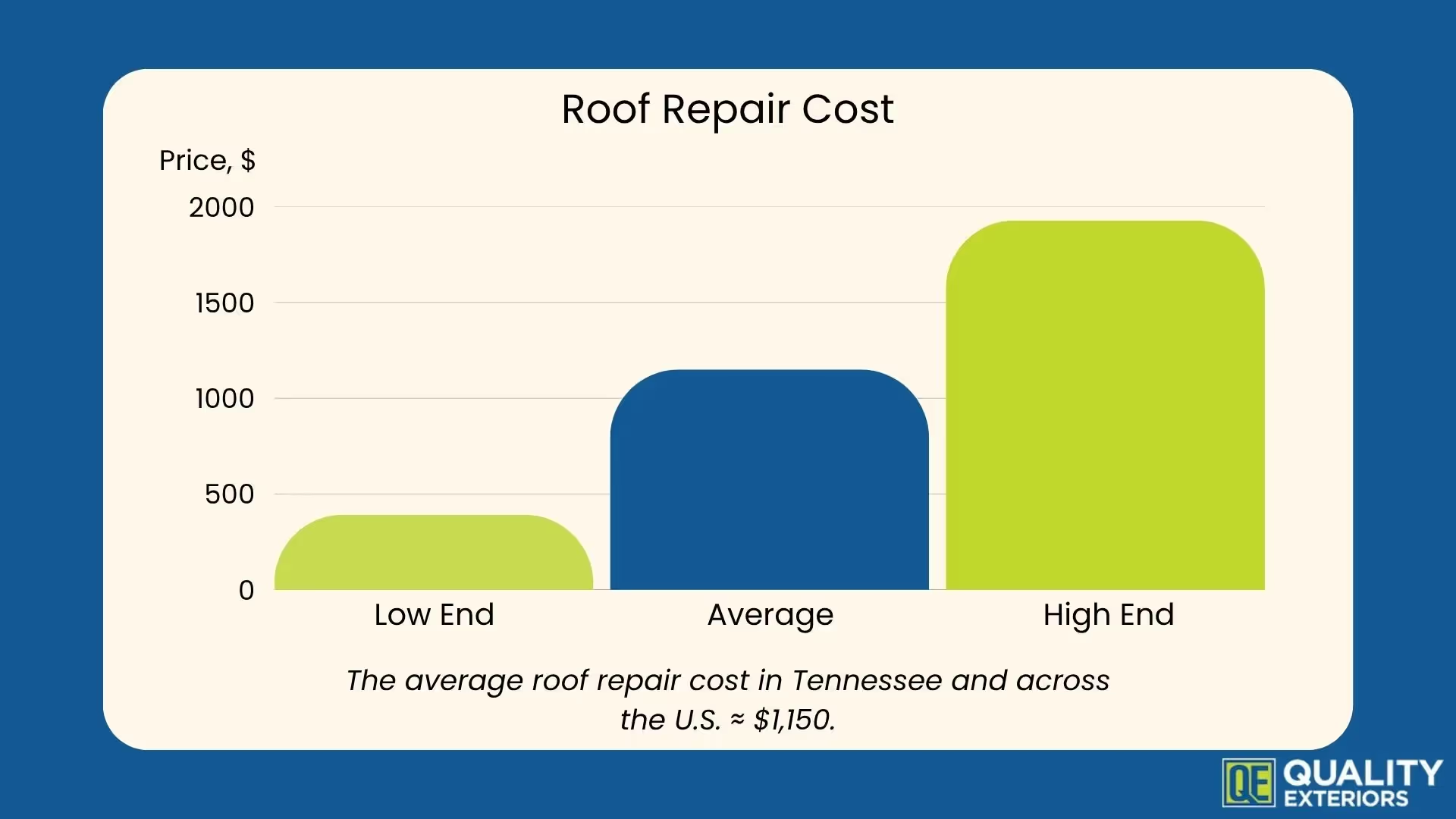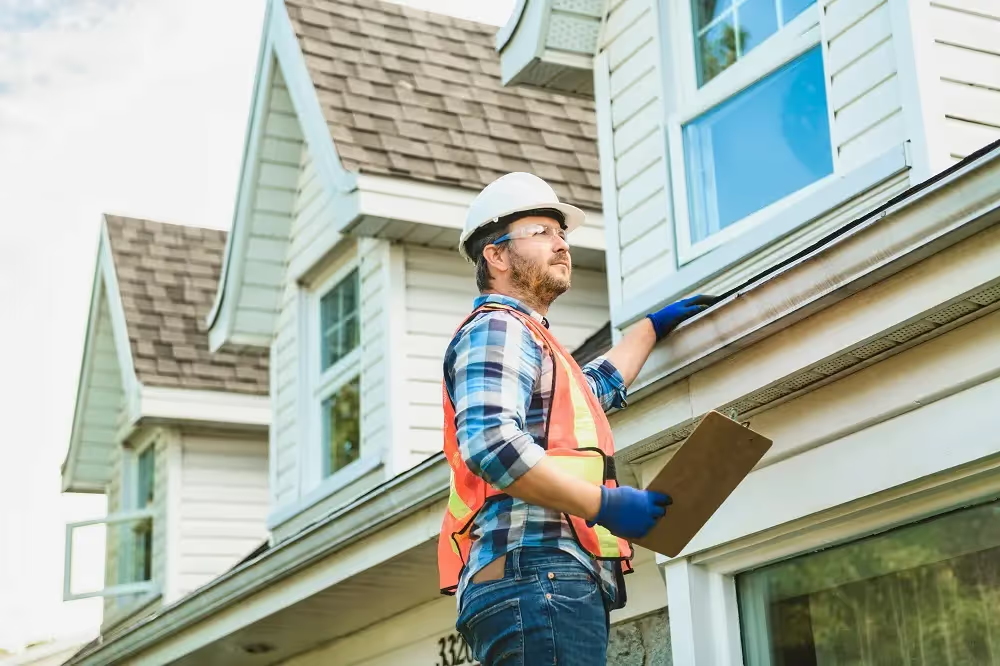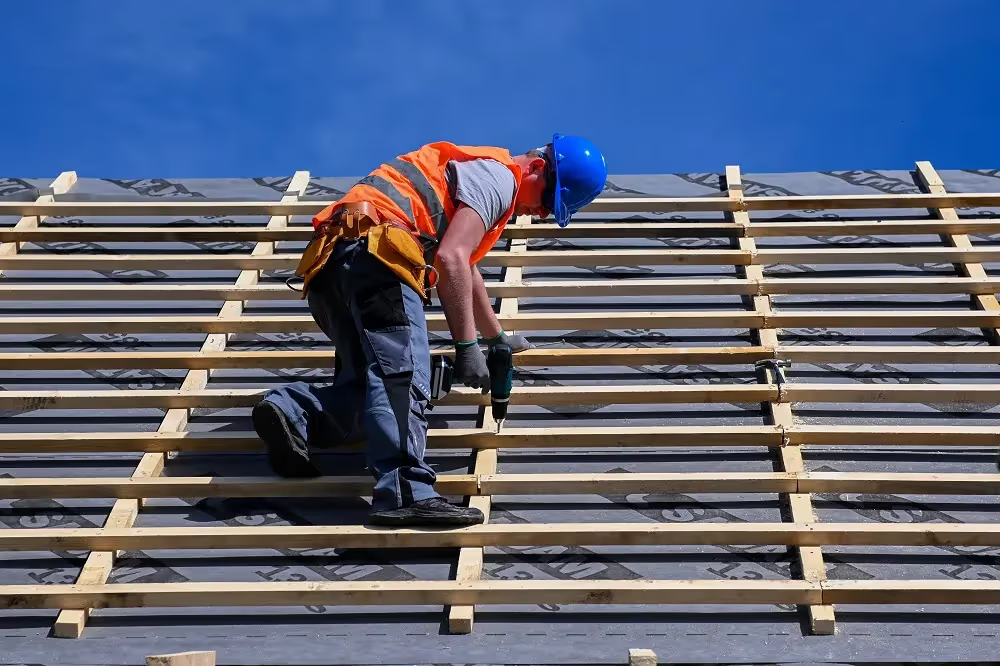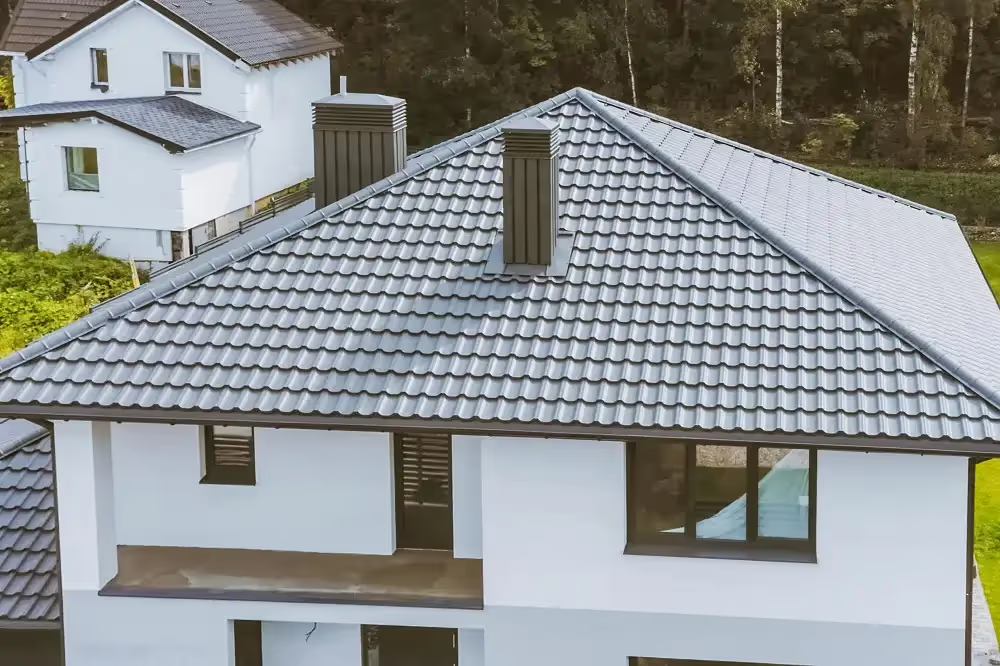The Average Roof Repair Cost in Tennessee and Across the U.S.

Most Tennessee homeowners spend between $392 and $1,928 on roof repairs, with the average repair cost landing at $1,150. This range aligns closely with national averages, though costs can vary significantly based on your location, the type of repair needed, and the roofing material involved.
Tennessee Regional Cost Variations
- Nashville/Franklin area: $450–$2,100.
- Murfreesboro region: $400–$1,900.
- Chattanooga area: $375–$1,850.
- Rural Middle Tennessee: $350–$1,800.
Keep in mind that these variations reflect local labor rates, material availability, and market competition. Urban areas like Nashville typically see higher costs due to increased overhead and labor rates, while rural areas might have lower base costs but could incur additional travel charges.
Common Roof Repair Types and Costs

The actual cost of your roof repair depends heavily on the extent of damage and required work. We’ve provided a detailed breakdown of what you can expect:
Minor Repairs ($150–$1,000)
Minor roof repairs typically address isolated issues before they become major problems. This category includes projects such as:
Minor repairs may seem simple, but they’re vital to maintaining the integrity of your roof. Tackling these small fixes early can save you thousands of dollars in the long run and extend the lifespan of your existing roof. It’s always best to be proactive when it comes to protecting your home.
Moderate Repairs ($1,000–$2,000)
Moderate repairs address more significant issues that could compromise your roof's integrity:
Moderate repairs are essential for maintaining your roof’s durability, especially after severe weather or when multiple issues arise at once. These projects typically require a full day or more of work and more substantial materials.
Major Repairs ($2,000–$8,000)
Major repairs often involve structural work or extensive water damage repair. These repairs may be needed after extreme weather events or long-term neglect.
Major repairs represent a significant investment, but they’re often necessary to ensure your home’s safety and prevent further structural damage. If you ignore a major repair, it could lead to even more expensive and frustrating scenarios in the future.
Cost Factors for Tennessee Homeowners
When it comes to roof repairs in Tennessee, no two projects are the same. The cost of repairs can vary widely depending on the type of repair, the materials used, and the extent of the damage. We’ve outlined some common cost factors for you to keep in mind.
Regional Weather Considerations
There’s one factor that sets Tennessee apart: the state’s unpredictable and often harsh weather patterns. Its unique climate presents specific challenges that affect roof repair costs and frequency:
- Spring: Heavy rains and storms require immediate leak repairs.
- Summer: Intense heat can cause shingle deterioration.
- Fall: Ideal repair season with moderate temperatures.
- Winter: Freeze-thaw cycles can damage roofing materials.
Material Costs
How much a roof repair costs is closely tied to the type of roofing material you choose. We’ve provided a breakdown of the average cost per square foot for common roofing material (installed), alongside the typical repair costs you can expect based on common issues such as missing shingles, leaks, or cracked tiles.
Labor Costs, Timing, and Complexity
Professional roofing companies in Tennessee generally charge between $45 and $75 per hour, with rates varying based on the job complexity and regional demand. While minor roof repairs like replacing a few missing shingles can be completed in as little as 1–3 hours, larger repairs — such as roof truss repair or structural repairs — may take several days.
Another significant factor is the design of your roof. This influences repair costs due to variations in labor, time, and safety requirements. Here are the key design factors to consider:
- Pitch and steepness: Steeper roofs require more time, labor, and safety equipment, which increases overall costs.
- Roof complexity: Roofs with multiple planes, dormers, and valleys take longer to repair due to intricate cuts and additional materials.
- Accessibility: Hard-to-reach roofs, especially on multi-storey homes, may need specialized equipment, which increases labor expenses.
- Flat roofs vs. pitched roofs: Flat roofs are generally quicker and cheaper to repair, while pitched roofs cost more due to their slope and detailed work.
Emergency Roof Repairs

When unexpected damage occurs, emergency repairs prevent further issues. Emergency services typically cost 25–50% more than standard repairs but can save thousands in potential damage. Here are some common emergency scenarios:
- Storm damage requiring immediate coverage
- Fallen tree damage
- Major leaks during rain events
Pro tip: Check your homeowners’ insurance to see if it covers emergency repairs and storm damage. This can help offset some of these additional expenses.
Roof Size and Design
In addition to the design of your roof, the size will also play a large role in determining the total repair cost. In the roofing industry, measurements are typically expressed in "squares", where one square equals 100 square feet of roofing surface. Here's how roof size affects the cost:
When to Repair vs. Replace Your Roof
Deciding whether you should repair or replace your roof is a crucial step in protecting your home and managing your budget. You don’t need to feel overwhelmed by making this decision! In some cases, roof repairs — such as those categorized as minor, moderate, or major repairs — can restore your roof’s integrity and prevent further damage.
However, there are times when a complete roof replacement is the smarter long-term investment. Constant repairs can add up quickly, and if the damage is severe or the roof’s structure is failing, patchwork fixes may only delay the inevitable. A roof replacement might be needed in the following situations:
- Extensive damage: If over 30% of the roof is damaged, replacement is often more cost-effective than multiple repairs.
- End of lifespan: Roofs nearing the end of the roofing material lifespan may need replacing even with minor wear.
- Compromised structural elements: Issues like failing roof trusses or significant sagging indicate the need for a full replacement to ensure safety.
If you're considering a replacement, it's helpful to understand the other signs that it's time for a new roof. Be sure to check out our in-depth guide on when to replace your roof to learn more about warning signs and roof replacement costs.
#cta_here
DIY vs. Professional Roof Repair: What’s Best for You?
There isn’t a one-size-fits-all when it comes to keeping your roof in pristine condition. Roof repairs can either be a DIY project or a job left to the professionals. The choice depends on the complexity of the repair, your skill level, and safety considerations.
When DIY Is an Option
Potential savings: DIY projects can save you between $200 and $500 in labor costs.
DIY repairs are typically ideal for simple, small-scale maintenance tasks that don’t involve structural components or high-risk areas. These include projects like:
- Replacing a few missing shingles: Replace blown-off asphalt shingles with nails and sealing compound.
- Minor gutter repairs: Clear clogs, seal small leaks, or reattach loose sections to improve drainage.
- Basic maintenance: Reseal vent boots and check flashing for cracks to extend your roof’s lifespan.
When to Call a Pro

Some roof repairs are simply too complex or hazardous for DIY work and require the expertise of a roofing contractor. Call a pro if you need:
- Structural repairs: Sagging, cracks, or roof truss repair issues need expert work to ensure safety.
- Complete roof inspections: Pros can spot hidden damage after storms that DIYers might miss.
- Insurance claim work: Insurance claims often require estimates from licensed roofers.
- High or steep roof repairs: Steep or multi-level roofs are dangerous and need professional handling.
- Complex flashing work: Chimneys, skylights, and roof valleys have intricate flashing that needs precision.
Even for simple issues, consider scheduling a professional consultation if your roof is nearing the end of its lifespan. A small repair might not be enough if a larger replacement is needed soon. The last thing you want is to attempt a repair on your own only to make the problem worse.
Choosing the Right Roofing Professional: What to Look For
Perhaps one of the most important considerations is which roofing contractor you’ll choose. This decision is crucial to ensure quality work and avoid unnecessary expenses. A reputable contractor can make the difference between a long-lasting repair and a quick fix that fails over time. Here are some key factors to consider when making your choice:
- Proper licensing and insurance: Confirm the contractor is licensed and insured to avoid liability for accidents or damage.
- Local reputation and references: Look for a contractor with strong reviews and local referrals to ensure reliability.
- Written warranties: Choose a contractor who offers warranties on labor and materials to cover future issues.
- Emergency service availability: Pick a contractor who provides emergency roof repair services, especially in storm-prone areas.
- Experience with your roofing material: Ensure the contractor is experienced with your roofing material, whether it’s asphalt shingles, metal, or slate.









.webp)
